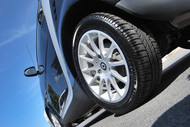Is It Time to Replace Your Vehicle's Ball Joints?
13th Jan 2021

What Are Ball Joints?
Ball joints are an important part of your vehicle's suspension. Consisting of a metal ball and grooved socket, they allow the front wheels to move smoothly and synchronously. Over time, though, ball joints can degrade. They can wear down to the point where they no longer provide a smooth ride. How do you know when it's time to replace your vehicle's ball joints exactly?
The Importance of Ball Joints
Since they are part of your vehicle's suspension, ball joints will affect how your vehicle "feels" when driving. Your vehicle's suspension is essentially what creates a smooth ride. It absorbs the shock of bumps in the road so that you don't bounce around while driving. If your vehicle's ball joints are bad, the suspension may fail to perform its intended function. Even when driving over minor bumps, you'll bounce around due to the bad ball joints.
How Ball Joints Fail
Ball joints typically fail in one of two ways: they leak oil, or they are exposed to dirt and debris. Ball joints contain oil as a lubricant. Oil allows the ball to glide around inside of the grooved socket. If there's a breach in a ball joint, oil may escape so that it no longer provides lubrication.
Exposure to dirt and debris can cause your vehicle's ball joints to fail as well. Normally, ball joints are sealed. With a sealed design, oil can't leak out of them and dirt or debris can't enter them. But ball joints can wear down over time, eventually creating small breaches that expose them to dirt and debris. When this occurs, the ball joints may deteriorate more rapidly.
When to Replace Your Vehicle's Ball Joints
You should consider replacing your vehicle's ball joints if you experience suspension problems suggesting that the ball joints have failed or are beginning to fail. Excessive tread wire is a common symptom of bad ball joints. When the ball joints begin to fail, your vehicle's suspension will absorb less shock. In turn, your vehicle's tires will lose more tread.
You may hear a squeaking noise coming from your vehicle's front end if the ball joints are bad. This usually occurs when dirt or debris enters the ball joints.
Another common symptom of bad ball joints is excessive vibrations. Your vehicle will inevitably produce some vibrations, but if it feels particularly shaky, it could be a sign of bad ball joints. After all, ball joints are a suspension component, and the suspension system is responsible for producing a smooth ride.

